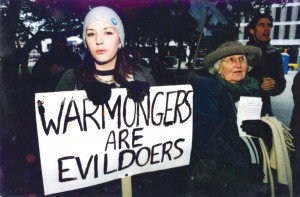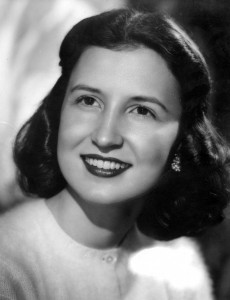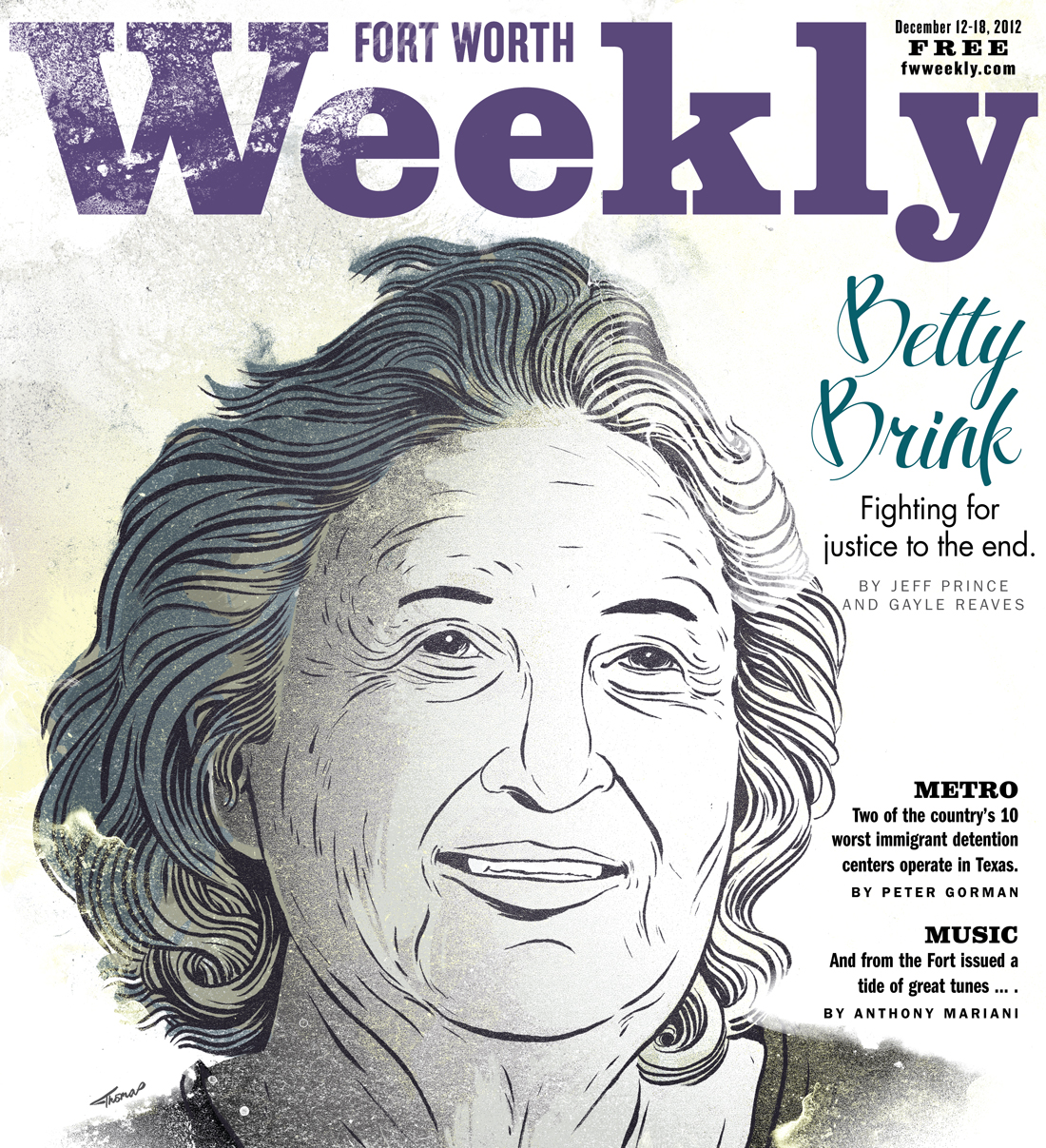You couldn’t call Betty Brink the face of Fort Worth Weekly because reporters seldom get their mugs in the paper. Most readers had no idea that the byline attached to her hard-hitting investigative stories belonged to a short, white-haired, slightly stooped woman who turned 80 this year.
You could, however, call Brink the paper’s heart and conscience.
The award-winning writer died Monday morning in the same southeast Fort Worth farmhouse where she’d grown up. She continued writing investigative stories up until a couple of months ago, when she suffered a major stroke. At the end, her family was around her, and her husband Charlie was at her side, where he’d been since he proposed to her in 1954.
Brink fought against injustice for most of her life. Her bedroom window looks out over a neighboring yard — the site of her first protest march way back in 1940, when she was 8. An uncle who lived next door banned neighborhood kids from his yard after they got into his tool shed. Brink made protest signs –– “Uncle Ralph Is Unfair to Children” –– and convinced two cousins to march with her in front of his house. Uncle Ralph later relented.
That willingness to do battle never left her.

“Betty always had the fight in her,” said John Forsyth, the Weekly’s editor from 1996 to 2001. “She always had the will to write the story, especially for the people who didn’t have a voice.”
Founding publisher Robert Camuto envisioned an arts and entertainment guide when he started the Weekly in 1996. Forsyth recalled a “sweet-looking grandmother” who showed up at the paper not long after it opened to ask Camuto for a reporting job.
“Before I knew it, Betty was on our team,” Forsyth said. “You didn’t so much meet Betty as get swept up in the windstorm she created.”
Brink made it clear she wasn’t interested in writing about arts and entertainment. She wanted to write about government, politics, industry, and the environment. Her profile of Fort Worth schools Superintendent Thomas Tocco (“The Truth About Tocco,” Sept. 19, 1996) exposed many of his warts, including his tendency to spend taxpayer money on questionable deals that sometimes benefited cronies. The story also revealed that the married superintendent was having an affair with a school employee, who was promoted from vice principal to principal during their relationship.
Brink’s story let residents — and the Fort Worth Star-Telegram –– know that a new publication was in town and willing to slaughter sacred cows.
“She quickly became the voice of the paper,” Forsyth said.
Afflicting the comfortable and comforting the afflicted came naturally to Brink. Not long before she picketed Uncle Ralph, she visited Leonard’s Department Store in downtown Fort Worth with her mother. Betty was about 5 at the time, and she was thirsty. Drinking fountains labeled “colored” and “whites only” piqued her interest.
“Is the water different?” Betty asked her mother.
No, her mom replied.
So Betty drank from the “colored” fountain.
********

Poking a stick at authorities while standing up for underdogs would define her for the rest of her life. She was a rebel with many causes but usually genial, even when knee-deep in her latest story or cause. People expecting to meet an intense, driven crusader were often surprised at her easy manner and quick laugh.
Independent-minded parents taught her the Golden Rule when she was growing up: Treat people as you would want to be treated.
“She took it to heart and really carried it out,” sister Suzanne Mabe said.
Brink graduated from Everman High School in 1949. An early first marriage ended in divorce after two children. She met Charlie Brink when one of her uncles brought him home at Christmas, and they married the next year.
Charlie adopted Betty’s two daughters, and the couple eventually had a son and two more daughters. None of the girls got middle names because their mom had always hated being called “Betty Lee” as a child.
Her willingness to take on authority created joy, uncertainty, danger, and magic through the years, particularly after she and Charlie moved their family to Tyler in the late 1950s. Charlie was soft-spoken but shared his wife’s passion for bucking injustice.
Segregation was common in East Texas, and townsfolk were shocked by this new woman haranguing city leaders about racial injustice.
“They began to lose friends over it, because people got angry if you thought about blacks and white being together,” Mabe said.
In 1962 the family moved from Tyler to Orange, and Brink got involved in the civil rights movement. She visited black communities, knocked on doors, and introduced herself to parents, who began letting her take the children on outings.
“Friends couldn’t come to play at our house because they called us n-lovers,” daughter Becky Yarbrough said.
On one outing, Brink took her five children and a vanload of black kids to the public library to listen to a librarian read children’s stories. Black children weren’t welcome. Brink decided to change that. She herded her large brood into the library like a mother hen protecting chicks, and had them sit down on the floor in front of the startled librarian.
“You could have heard a pin drop, but Momma didn’t care,” youngest daughter Sarah Goodall-Rogers said.
The librarian stared in silence. After a pause that seemed to last forever, she slowly started reading from her book again. The color barrier was broken. Later, Brink enrolled her daughters in what had been an all-black Girl Scout troop.
“That first step was all that was needed, and Momma was always willing to take that first step,” Yarbrough said
********













I didn’t know Betty for nearly as long as everyone else. I’m just a 26-year-old upstart who’s worked at the Weekly full-time for less than a year. Unlike many veteran journalists that I’ve known, however, Betty treated me like a complete equal. As far as I could tell, she didn’t have a condescending bone in her body. I took over some of the stories that Betty would have written, and she was more complimentary of my work than it probably deserved. Every time I would tell her that so-and-so had talked about how talented she was, she’d always deflect the praise and bring it back to what I was doing. Betty wasn’t just a great journalist, she was a first-class human being and a woman who has always been ahead of her times, as evidenced by the cover story this week. Wherever I go in this career, I’ll take memories of her indomitable spirit with me.
Betty was forward thinking and rarely talked about her past exploits. She lived in the present. She was the first person I knew to buy a hybrid car. She was about 70 at the time. I gave her a hard time for spending $30k on a dinky little car with little power, but she was proud to own it. We clashed over a lot of things during the 12 years I worked with her, but none of our disagreements caused any problems in our friendship. I always enjoyed hanging out with her and taking her to Mexican food dives on the North Side to discuss stories we were working on. She’s the only person I know who would order a plate of enchiladas and a hot cup of black coffee to wash it down.
I was one of a few twentysomethings and college students who worked at FW Weekly when it started in the 1990s, in that little frame house where Lanny’s is now. We were in awe of Betty. We loved her stories about fighting injustice, and envied her ability to get the story and make her subjects, many of whom she took down with her words, still admire her. She treated every one of us, from full-timers to freelancers to interns, as equals. Her encouragement was welcome, her praise cherished. And she was always the hit when we met for an after-work beer. We’ll miss you, Betty. The world needs more like you.
I’m deeply saddened by this loss. I met Betty when I worked as the Art Director for the Fort Worth Weekly. Before I knew anything about her my first impression was, “What an extremely interesting and eccentric woman. I wan’t to be like her when I’m her age!” Then, as I got to know her over the years, I realized just how special she was. I was always glad to see Betty come into Production. I loved her stories and she loved my covers. 🙂 She lifted my spirit whenever I saw her. I will always admire you, Betty. You will always be one of my biggest role models. R.I.P. We love you.
What a beautiful tribute to a person who truly used their time on earth to benefit others and make the world a better place. Unlike those who claim to be civil rights activists, Betty “walked the walk”. Always the professional, investigative, journalist, her sole purpose was to uncover the truth, and speak for those who had no voice. Betty never let her “like” or “dislike” of a political figure get in the way of the truth. She dug for the facts and let the facts tell the story. Writing about FWISD was almost a full time job as the available material was abundant and remains never-ending. That has not changed. Tocco, Johnson, Dansby – to read Betty’s story on one, is to read a story on the other. The names have changed but the deeds and lack of leadership remain the same. I believe with her work on the AHHS/Palazzolo story, her great disappointment was the failure of taxpayers to take the importance of School Board membership seriously. She believed many on the Board were simply out of touch and had been there too long. She focused on FWISD because that is where she was needed. She was a true Texan who should forever remain an icon of Fort Worth.
Well said. Even though I often disagreed with her,she was some kind of fine Texas lady,and had a much more interesting life than I would have suspected. Her husband, children and grandchildren are obviously so proud of this wonderful woman. In fact, her life story –especially regarding the research of prison conditions at Carswell federal prison– would make an interesting movie screen-play….just sayin’. (and no, I don’t work for the FW school board,etc.)
BettyB’s absence already felt. I will miss her hard hitting articles and living proof no matter what your age, you can make a difference. She was a journalist and seeker of truth and justice all her life. May her family take pride in that and may she serve as an example to us all.
RIP.